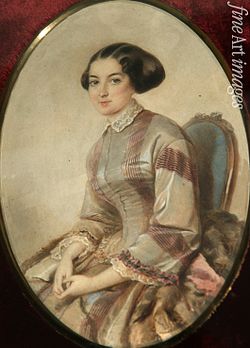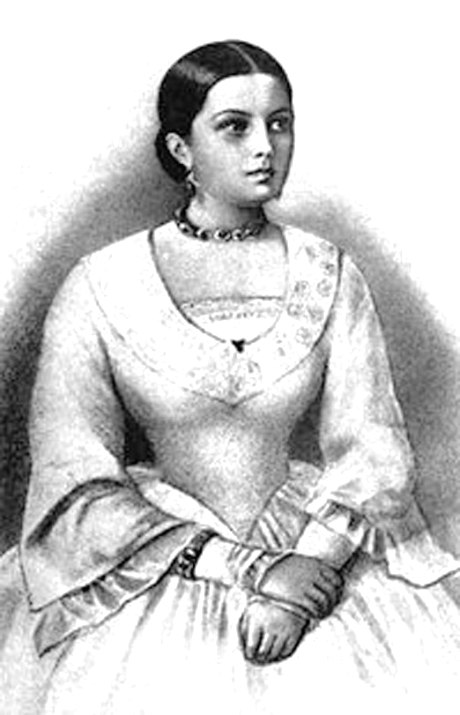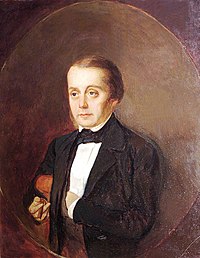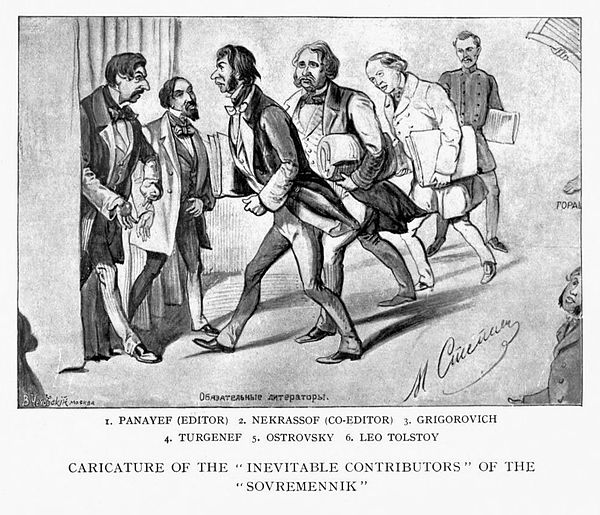Avdotya Panaeva
Awdotja Jakovlevna Panayeva (Russian Авдотья Яковлевна Панаева, scientific transliteration Avdot'ja Jakovlevna Panaeva; born Awdotja Jakovlevna Brjanskaja [ Брянская ]; her second husband Golowatschowa [ Головачёва ]; * August 12, 1820 in Saint Petersburg, † April 11, 1893 in Saint Petersburg ) was a Russian writer. Under the male pseudonym NN Stanizki ( Н. Н. Станицкий ) she has published a number of successful novels and short stories. Been known about their time, it is through the literary salon, which she shared with her first husband, Ivan Panayev led. The most important writers of the time have wrong there. Panajewas memoirs have thus become an important historical document.
Life and work
Panayeva was the daughter of well known actor, received at the St. Petersburg theater school at an academically inferior education and was, after the desire of the parents to be a ballet dancer. However, in order to escape the stage environment and the tyranny of her mother, she married at age 18 the writer Panayev. The couple had several children, who all died young.
The apartment had the address Liteyny Prospekt 36 in Sankt Petersburg and now houses a museum. Many of the men who frequented her salon, fell in love with Panayeva, including the 24 -year-old Dostoevsky, who had read in her apartment in mid November 1845 from his first poor people and was until 1846 a frequent guest. At the latest in 1848 Panayeva began a long-standing partnership with Nikolai Nekrasov. The marriage with Panayev consisted at that time only on paper, and Nekrasov even lived in the same apartment as a couple.
1848 published Panayeva their first literary work, family Talnikow who fell victim to censorship, because they found that the work " morality and parental authority " undermining. The autobiographical novella had tyrannical, selfish parents about, which is the fate of their children indifferent. It was one of the first Russian prose works, described the childhood. Together with Nekrasov wrote Panayeva then the melodramatic novels Tri colored strany sveta (1848 ) and Mërtvoe Ozero (1852 ).
Without Nekrasov's involvement emerged Žena časovogo mastera (1849 ), the novella Step Well baryšnja (1855 ) and Roman v peterburgskom polusvete (1860 ). All three treated the then current throughout Europe theme of life and the social position of women, who were usually so completely dominated by her husband. Panayeva was heavily influenced by George Sand.
Panayeva lived for a time in other European countries. Tradition has it about that they met in the late summer of 1856 with Nekrasov in Vienna. As Panayev died in 1862, she could have married Nekrasov; however, the relationship was exhausted and ended in 1863 completely. Panayeva moved out of their apartment. 1864, she married Apollo Filippowitsch Golowatschow, who worked as a journalist at Sovremennik. Their daughter, Eudoxia Apollonowna Nagrodskaja, was a writer.
As Golowatschow died in 1877, Panayeva remained destitute and wrote to support herself and the daughter, her memoirs. Historical significance owe these memoirs of immediate intuition, Panayeva had as a wife and as a partner Panajews Nekrasov from the innermost circle of the Russian intelligentsia. These two men were the ones who from 1847 to 1863 the journal Sovremennik ( Современник ) gave out, which was the focus of intellectual life this time. Panayeva First published her memoirs in 1889 in the journal Historical Herald and 1890, then in book form.
Works
- Semejstvo Talyikovych (Russian: Семейство Талыиковых, in German, the title means: family Talnikow ) Powest, 1848
- With Nekrasov: Tri strany sveta ( Три страны света; Three countries of the light), novel, 1848
- With Nekrasov: Mërtvoe Ozero ( Мёртвое Озеро; Dead Sea), novel, 1852
- Step Well baryšnja ( Степная барышня, A young lady from the steppe ), Powest, 1855
- Roman v peterburgskom polusvete ( Роман в петербургском полусвете, A Romance in St. Petersburg demimonde ), novel, 1860
- Vospominanija ( Воспоминания; memories ), 1890










